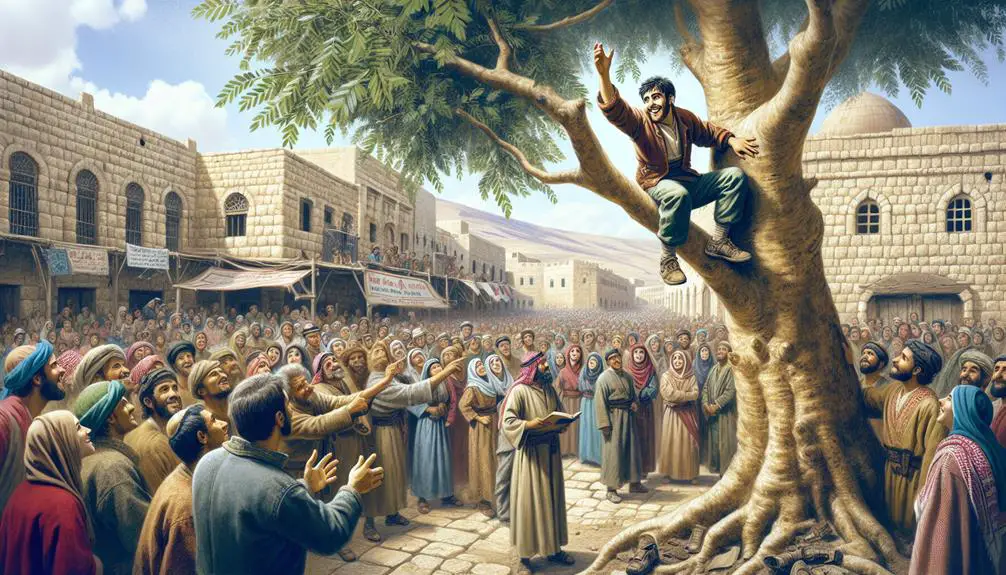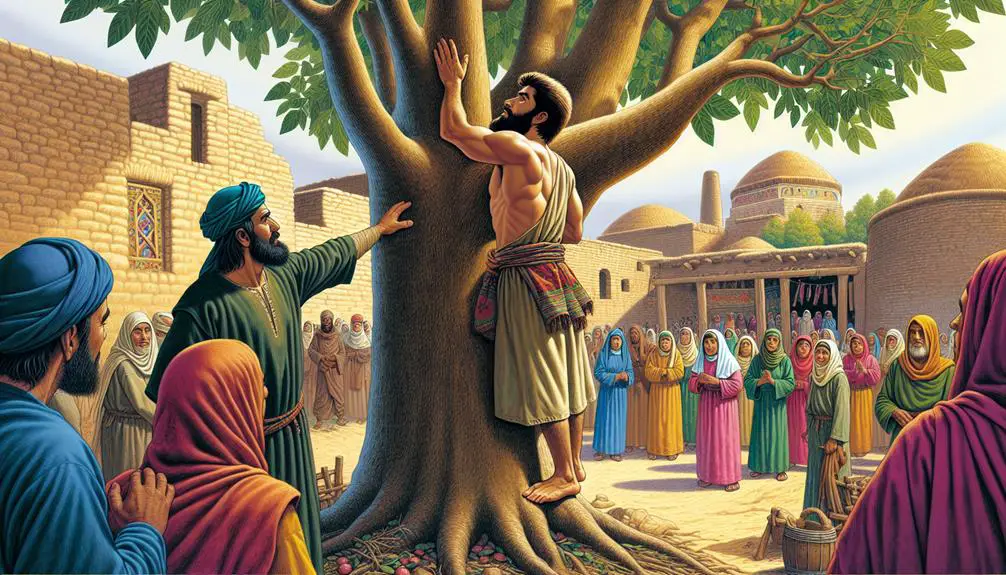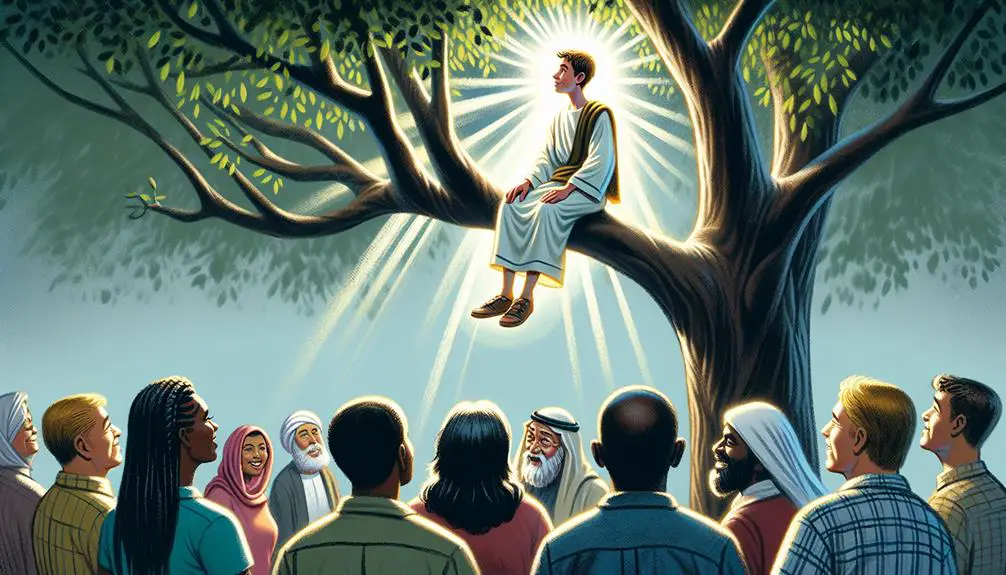Witness how a short man's encounter with Jesus in the Bible offers lessons in faith, redemption, and the power of transformation.

Short Man in the Bible
In the tapestry of biblical narratives, the story of Zacchaeus, a man of short stature, emerges with profound lessons that transcend mere physical limitations. This account, while brief, opens a window into the dynamics of faith, redemption, and the essence of spiritual transformation.
Zacchaeus's encounter with Jesus, amidst the backdrop of societal judgment and personal shortcomings, presents an intriguing exploration of how overcoming physical and societal barriers can lead to profound spiritual enlightenment. The narrative invites us to consider the deeper implications of this encounter, suggesting that the true measure of a person extends far beyond their physical dimensions.
Key Takeaways
- Zacchaeus, a short-statured tax collector, climbed a tree to see Jesus, overcoming physical and societal barriers.
- His encounter with Jesus symbolizes the transformative power of faith and divine grace.
- Despite societal disdain for his profession, Zacchaeus's story emphasizes personal determination and divine selection beyond physical limitations.
- Zacchaeus's transformation showcases the potential for change and the importance of faith in overcoming adversity.
Zacchaeus's Encounter

One of the most notable instances involving a diminutive figure in the Bible occurs when Zacchaeus, a short-statured tax collector, seeks to witness Jesus's passage through Jericho, illustrating a profound moment of spiritual transformation and societal reevaluation. The act of Zacchaeus climbing a tree to see Jesus highlights the lengths to which individuals might go to seek out enlightenment or personal revelation, despite societal barriers or personal limitations. This episode is not merely about overcoming physical shortness but also transcends to the metaphorical barriers that hinder personal growth and societal acceptance.
Zacchaeus's profession as a tax collector places him in a unique societal position. Tax collectors were often viewed with disdain in biblical times, perceived as traitors and sinners for their role in collecting taxes for the Roman authorities from their fellow Jews. This profession suggests not only Zacchaeus's social isolation due to his job but also his economic status, which could afford him the luxury of stepping away from his duties to pursue a personal interest in Jesus's teachings. The act of tree climbing, then, becomes a symbolic rejection of his previous life and societal role, demonstrating a humility and eagerness to change.
The encounter of Zacchaeus with Jesus, facilitated by his decision to climb a tree, emphasizes the intersection between personal determination and divine intervention. It showcases the lengths to which individuals may go to overcome societal and personal obstacles for the sake of spiritual or personal enlightenment. This narrative serves as a vivid illustration of the challenges associated with tax collecting and societal ostracization, as well as the transformative power of seeking out and embracing new paths.
Spiritual Significance

The spiritual significance of Zacchaeus's encounter with Jesus extends beyond a mere physical meeting, delving into themes of redemption, transformation, and the breaking down of societal barriers. This story, rich in metaphorical and theological implications, highlights how divine grace is extended to all, regardless of societal standing or physical stature. Zacchaeus, despite his short stature and the height bias he faced, was chosen by Jesus in an act of divine selection that emphasizes the inclusivity of divine love.
The narrative underscores several key spiritual themes:
- Divine Selection: Zacchaeus's story illustrates that divine selection is not based on physical attributes or societal status but on the heart's openness to transformation and redemption.
- Redemption and Transformation: His encounter with Jesus led to a profound personal transformation, symbolizing the transformative power of divine grace that is available to everyone, irrespective of past sins or societal judgment.
- Breaking Down Societal Barriers: Jesus's choice to associate with Zacchaeus, a tax collector despised by his community, demonstrates the breaking down of societal barriers, promoting inclusivity and acceptance in the spiritual community.
- Confronting Height Bias: The narrative subtly challenges the height bias prevalent in society by showing that physical limitations do not determine one's spiritual worth or the capacity to experience divine encounters.
Analyzing Zacchaeus's story through these lenses offers a deeper understanding of its spiritual significance, emphasizing themes of divine selection, redemption, transformation, and the dismantling of societal prejudices, including height bias.
Overcoming Limitations

Zacchaeus's narrative in the Bible exemplifies the profound ability of individuals to transcend their physical and societal limitations through faith and personal transformation. This story is not just a historical account but a metaphorical illustration of overcoming barriers through a growth mindset and adaptive strategies. Zacchaeus, despite being short in stature and marginalized due to his occupation as a tax collector, demonstrates an extraordinary commitment to change and self-improvement.
Aspect |
Insight |
|---|---|
Growth Mindset |
Zacchaeus's willingness to change his life view |
Adaptive Strategies |
Climbing a tree to see Jesus |
His decision to climb a tree, an unconventional and innovative approach, underscores the importance of adaptive strategies in overcoming physical limitations. This act is symbolic of his readiness to rise above societal judgments and personal constraints, showcasing a growth mindset that embraces challenges as opportunities for development.
The narrative further reveals that limitations, whether imposed by society or self, can be transcended through determination and the pursuit of personal growth. Zacchaeus's transformation from a marginalized individual to a pivotal figure in biblical teachings underscores the potential within each person to overcome barriers with the right mindset and strategies.
This story, thus, serves as a timeless reminder of the power of faith, determination, and the willingness to employ adaptive strategies in the quest for personal and spiritual growth. Zacchaeus's journey from limitation to liberation is a testament to the human capacity for change and the profound impact of adopting a growth mindset in overcoming life's obstacles.
Lessons on Faith

Through his encounter with Jesus, Zacchaeus illustrates the transformative power of faith in overcoming spiritual and personal challenges. This narrative, deeply embedded in the Christian tradition, offers profound insights into the dynamics of faith as both a personal journey and a communal experience. Zacchaeus' story is emblematic of how divine encounters can catalyze a profound reorientation of one's life, underpinned by a faith foundation that facilitates personal transformation and societal reintegration.
An analytical exploration of Zacchaeus' encounter with Jesus reveals several key lessons on faith:
- Divine Encounters as Catalysts for Change: Zacchaeus' experience underscores the notion that faith is often ignited or rekindled by moments of divine intervention, which serve as pivotal points leading to significant personal evolution.
- Faith Foundation for Ethical Transformation: The narrative illustrates how a foundation of faith can prompt ethical reevaluation and restitution, signifying faith's role in moral and spiritual recalibration.
- Personal Initiative in Faith Journeys: Zacchaeus' proactive efforts to see Jesus emphasize the importance of personal agency in the pursuit of spiritual fulfillment and the development of faith.
- Communal Reconciliation Through Faith: His story also highlights how individual transformation, rooted in faith, can have ripple effects, fostering communal healing and reconciliation.
Perseverance in Adversity

The narrative of the 'Short Man in the Bible' embodies the essence of perseverance in the face of adversity, as illustrated through three distinct dimensions:
- Facing giants daily,
- Unwavering faith tested, and
- Triumph over obstacles.
Each point offers a unique lens through which to analyze the character's journey, revealing the complexities and nuances of maintaining faith and determination amidst challenges.
This exploration enables a deeper understanding of the biblical account, highlighting the universal themes of resilience and the human spirit's capacity to overcome.
Facing Giants Daily
Facing daily challenges akin to confronting giants requires unwavering perseverance and resilience, often pushing individuals to transcend their perceived limitations. The 'giants' metaphor powerfully symbolizes formidable obstacles, while height perceptions remind us of the inherent human tendency to feel intimidated by what seems larger-than-life. In facing these giants daily, several key strategies emerge:
- Cultivating a mindset of resilience and adaptability
- Setting realistic, incremental goals to tackle larger challenges
- Seeking support and collaboration to share the burden of obstacles
- Embracing failure as a stepping stone towards growth
These strategies not only facilitate overcoming adversity but also contribute to a deeper understanding of one's capacities and strengths. Such an analytical approach underscores the importance of perseverance in navigating the complexities of life's challenges.
Unwavering Faith Tested
Enduring adversity often serves as a crucible, testing the strength and depth of an individual's faith. Throughout the Faith's Journey, believers encounter moments where the path forward seems insurmountable, yet it is precisely in these instances that the potential for Divine Intervention becomes most apparent. The narrative of the short man in the Bible exemplifies this, illustrating how perseverance in the face of adversity can lead to profound spiritual growth and understanding.
Stage |
Challenge |
Outcome |
|---|---|---|
Initial Faith |
Societal Rejection |
Seeking |
Adversity |
Physical Limitation |
Perseverance |
Intervention |
Divine Encounter |
Renewed Strength |
Insight |
Spiritual Revelation |
Deepened Faith |
Continuance |
Ongoing Trials |
Unwavering Commitment |
Analyzing this progression, it becomes clear that unwavering faith, when tested, not only endures but flourishes, underscoring the transformative power of enduring faith in the face of adversity.
Triumph Over Obstacles
Perseverance in adversity, as illustrated by the short man's journey in the Bible, illuminates the pathway to triumphing over obstacles, showcasing the resilience and growth that emerge from steadfast faith in challenging times. This narrative provides a profound exploration into how individuals can overcome societal perceptions and limitations through a growth mindset.
- Adopting a Growth Mindset: Fostering an attitude of learning and improvement in the face of adversity.
- Challenging Societal Perceptions: Courageously confronting and rising above preconceived notions and biases.
- Resilience in Faith: Maintaining belief and perseverance despite seemingly insurmountable challenges.
- Personal Growth: The transformative journey of self-improvement and spiritual deepening as a result of overcoming obstacles.
Through this lens, the story transcends its historical context, offering timeless insights into human strength and adaptability.
Beyond Physical Stature

Transitioning from the narrative of perseverance in adversity, the focus now shifts to the realm beyond physical stature, emphasizing the profound spiritual significance, lessons, and character attributes highlighted in biblical accounts.
This examination reveals how stature, often deemed a critical determinant of capability in historical texts, is transcended by the virtues of faith, wisdom, and divine purpose. It posits that true greatness in biblical narratives is not measured by physical dimensions but by the depth of one's spiritual journey and moral integrity.
Spiritual Significance Explored
Exploring the spiritual significance of a short stature in biblical narratives often reveals profound insights into divine preference and human humility beyond mere physical dimensions. This perspective challenges height perceptions and societal biases, presenting a more nuanced understanding of worth and divine selection.
- *Divine Preference*: Illustrates how God often chooses individuals not based on societal standards but on heart and character.
- *Human Humility*: Suggests that physical limitations can foster a deeper reliance on God, rather than on one's strength.
- *Challenging Societal Biases*: Encourages reevaluation of how society measures worth and value, moving beyond superficial attributes.
- *Profound Insights*: Offers a deeper understanding of biblical teachings, emphasizing spiritual qualities over physical attributes.
This analysis underscores the complexity of divine choice, emphasizing spiritual merit over physical appearance.
Lessons Beyond Height
The examination of biblical narratives reveals that lessons derived from characters with shorter statures extend far beyond their physical measurements, illuminating spiritual truths and moral virtues intrinsic to personal growth and divine purpose.
Attribute |
Societal Perception |
Spiritual Lesson |
|---|---|---|
Height |
Often associated with leadership qualities |
True leadership is measured by character, not physical stature |
Stature |
May influence societal biases |
Demonstrates that divine selection transcends human biases |
Physical Appearance |
Can lead to underestimated capabilities |
Highlights the value of inner qualities over physical attributes |
Perception |
Height biases influence judgments |
Encourages looking beyond the physical to understand one's true worth |
Leadership |
Typically envisioned as a role for the physically imposing |
Teaches that spiritual strength is more critical than physical might |
This analysis underscores the need to challenge height biases and societal perceptions, advocating for a deeper understanding of individuals' capabilities and divine roles.
Character Over Physicality
Moving beyond mere physical measurements, it becomes imperative to examine the profound impact of character over physicality in biblical narratives, highlighting the essence of spiritual and moral virtues. The scriptures emphasize that true greatness is not measured by stature but by the depth of one's character and the strength of their moral convictions. This perspective serves as a vital lesson in recognizing the worth and capabilities of individuals beyond their physical attributes.
- Personality depth over physical size shapes individuals' destinies and interactions.
- Moral strength is highlighted as more crucial than physical might.
- Spiritual virtues are prioritized over physical appearances in assessing an individual's value.
- Transformative leadership and impact are often attributed to inner qualities rather than external characteristics.
This analytical approach underscores the timeless message that character, embodied in personality depth and moral strength, ultimately defines an individual's significance and legacy.
Frequently Asked Questions
Are There Any Archaeological or Historical Evidences That Specifically Confirm the Existence of Zacchaeus Outside of Biblical Texts?
The investigation into historical and archaeological evidence supporting the existence of Zacchaeus, beyond biblical narratives, reveals a paucity of direct confirmation.
This inquiry, focusing on Zacchaeus's occupation as a tax collector and the geography of Jericho, requires a meticulous examination of extant historical records and archaeological findings.
Despite the rich historical context of Jericho, there remains no specific archaeological or historical evidence conclusively linked to Zacchaeus himself as a historical figure.
How Has the Perception of Zacchaeus's Story Changed in Different Cultures and Religious Denominations Over Time?
The perception of Zacchaeus's story has undergone significant evolution, showcasing a remarkable cultural adaptability and interpretative diversity across various cultures and religious denominations. This adaptability is evident in the way different communities have imbued the narrative with unique moral and theological interpretations, reflecting broader societal values and religious teachings.
The story's core themes of redemption and transformation remain constant, yet its reception and emphasis vary greatly, embodying the dynamic nature of religious texts in cultural discourse.
Are There Any Notable Artworks, Literature, or Music Compositions Inspired by the Story of Zacchaeus That Have Significantly Influenced Cultural or Religious Views?
Interestingly, the narrative of Zacchaeus has inspired a diverse array of cultural artifacts, from Zacchaeus paintings to the Musical Zacchaeus, which have profoundly influenced both cultural and religious perspectives.
These artistic interpretations offer varying insights into the story's themes of redemption and transformation, highlighting its enduring relevance.
Through a scholarly examination, it becomes evident that such creative endeavors have not only enriched the narrative's interpretation but also facilitated its transmission across different cultures and generations.
How Do Modern Psychological Interpretations of Zacchaeus's Actions and Motivations Differ From Traditional Religious Understandings?
Modern psychological interpretations of actions and motivations, incorporating personality analysis and motivational psychology, offer a nuanced perspective that often diverges from traditional religious understandings.
By analyzing behavior through the lens of psychological theories, scholars provide insights into underlying motivations and personality traits that drive actions.
This analytical approach allows for a more complex understanding of behavior, moving beyond moral or spiritual interpretations to explore the multifaceted nature of human psychology and decision-making processes.
Can the Concept of 'Overcoming Limitations' as Seen in the Story of Zacchaeus Be Applied to Contemporary Issues of Inclusivity and Accessibility in Society Today?
The concept of 'overcoming limitations,' exemplified by historical narratives, can indeed be applied to modern discussions on inclusivity and accessibility.
This perspective highlights the pervasive impact of height bias and its implications for social mobility.
Conclusion
In conclusion, the biblical narrative of Zacchaeus serves as a seminal example of spiritual significance and societal perceptions of physical limitations. This account not only highlights the transformative power of faith and perseverance in adversity but also challenges preconceived notions of worth predicated on physical stature.
Through Zacchaeus's story, readers are reminded of the profound potential for personal growth and redemption beyond mere corporeal constraints, thus underscoring the universal applicability of its lessons in embracing one's identity and overcoming obstacles with unwavering faith.



Sign up